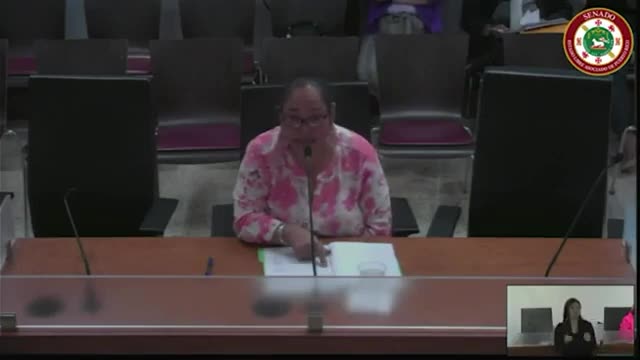Puerto Rico educators demand action to address pandemic-related academic setbacks for special needs students
January 25, 2024 | Senate, Committees, Legislative, Puerto Rico

This article was created by AI summarizing key points discussed. AI makes mistakes, so for full details and context, please refer to the video of the full meeting. Please report any errors so we can fix them. Report an error »

In a recent special commission meeting focused on legislative monitoring of the education program, educators voiced urgent concerns about the ongoing academic setbacks faced by students in Puerto Rico. The discussions highlighted the chaotic response to the COVID-19 pandemic, revealing a lack of preparedness and effective planning from the Department of Education.
Teachers recounted the struggles of adapting to virtual learning, often without necessary resources or support. One educator described the absurdity of having to sign documents online without understanding the digital signature process, while others shared stories of makeshift solutions like setting up tents for lunch distribution and managing restroom access with limited facilities. The distribution of inadequate supplies, such as fabric masks deemed ineffective by health authorities, further illustrated the disarray.
The meeting underscored a critical point: the academic regression experienced by students, particularly those with special needs, is a direct result of improvisation and neglect. Educators lamented the absence of a comprehensive study to assess the pandemic's impact on learning, especially for special education students. Without this data, the Department of Education has struggled to tailor educational services to meet the evolving needs of students.
Moreover, teachers expressed frustration over their exclusion from the evaluation and planning processes necessary for future crises. They emphasized the importance of incorporating their insights and experiences into the development of effective educational strategies. The call for collaboration was clear: educators want to be part of the solution, advocating for structured dialogues and practical measures to enhance educational resilience.
As the meeting concluded, the urgency for a strategic overhaul in the education system was palpable. Educators are ready to contribute their expertise to ensure that Puerto Rico's students receive the support they need to overcome the challenges posed by recent disasters and the pandemic. The path forward requires not just acknowledgment of past failures but a commitment to proactive planning and collaboration.
Teachers recounted the struggles of adapting to virtual learning, often without necessary resources or support. One educator described the absurdity of having to sign documents online without understanding the digital signature process, while others shared stories of makeshift solutions like setting up tents for lunch distribution and managing restroom access with limited facilities. The distribution of inadequate supplies, such as fabric masks deemed ineffective by health authorities, further illustrated the disarray.
The meeting underscored a critical point: the academic regression experienced by students, particularly those with special needs, is a direct result of improvisation and neglect. Educators lamented the absence of a comprehensive study to assess the pandemic's impact on learning, especially for special education students. Without this data, the Department of Education has struggled to tailor educational services to meet the evolving needs of students.
Moreover, teachers expressed frustration over their exclusion from the evaluation and planning processes necessary for future crises. They emphasized the importance of incorporating their insights and experiences into the development of effective educational strategies. The call for collaboration was clear: educators want to be part of the solution, advocating for structured dialogues and practical measures to enhance educational resilience.
As the meeting concluded, the urgency for a strategic overhaul in the education system was palpable. Educators are ready to contribute their expertise to ensure that Puerto Rico's students receive the support they need to overcome the challenges posed by recent disasters and the pandemic. The path forward requires not just acknowledgment of past failures but a commitment to proactive planning and collaboration.
View full meeting
This article is based on a recent meeting—watch the full video and explore the complete transcript for deeper insights into the discussion.
View full meeting